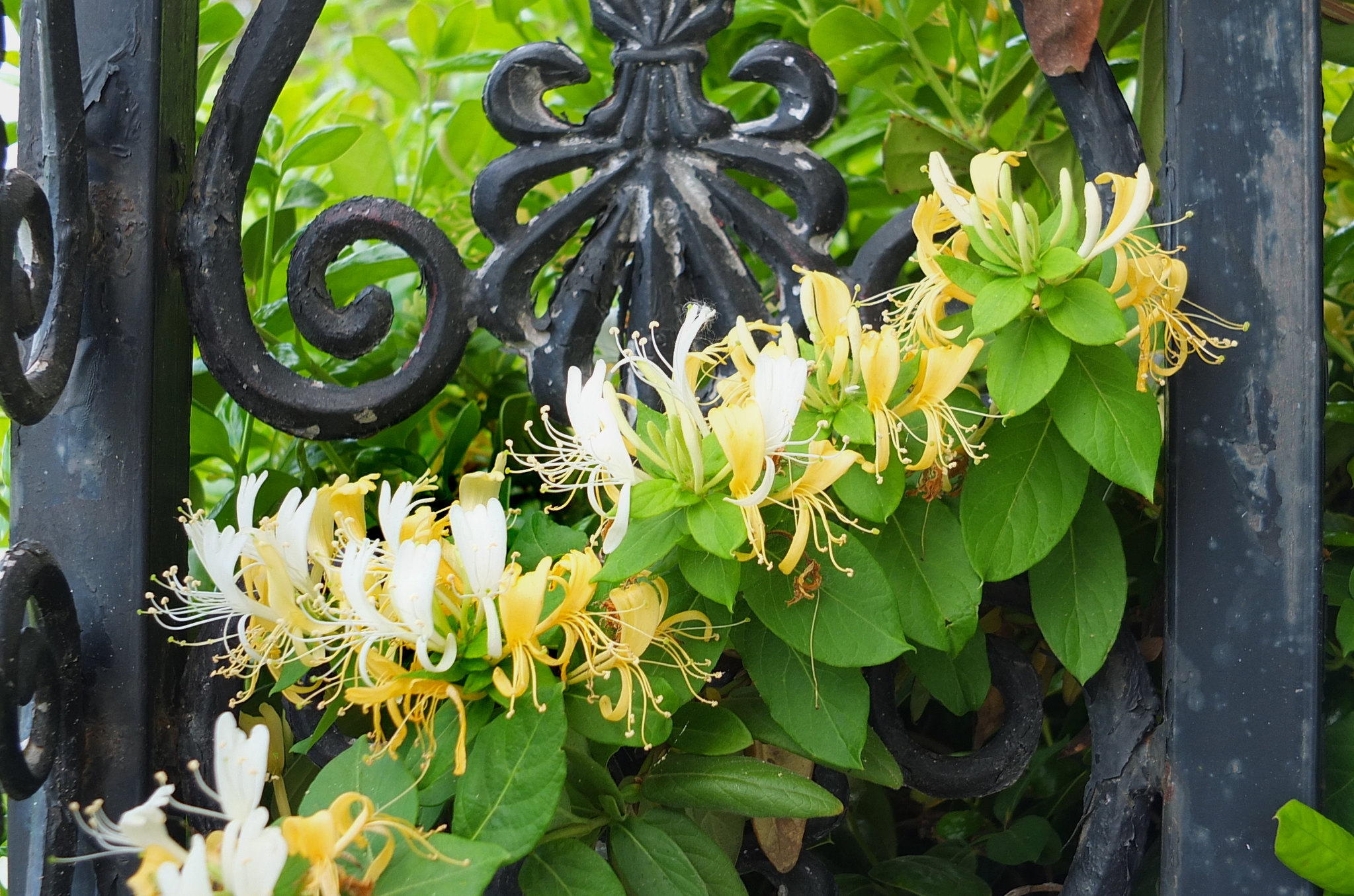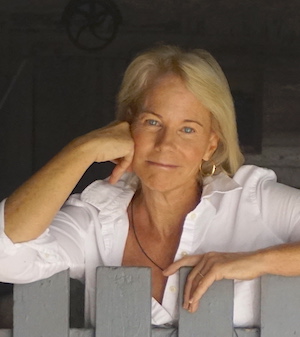Essay by Ryder S. Ziebarth
Generations on a New Jersey Farm

In the kitchen garden a few feet from the back door of our farmhouse, the twining vine of a honeysuckle persists. As long as I’ve been alive—more than six decades—it’s enveloped all four sides of a now abandoned well house in the center of the garden. The vine is at least a century old; it was here when my great-grandmother picked peaches for her pies in our orchard in the 1940s. Cedar Ridge, where my great-grandfather managed a thriving black angus cattle farm, has remained in our family ever since.
I grew up in a cozy cottage that was once the farm’s granary, a gift to my newlywed parents from my grandparents and just steps from their white-pillared Greek Revival house. My young mother and father turned the old barn into a home with polished wood floors and wide beams. They pounded nails by the yellow light of a kerosene lantern.
But when I was twelve, my father got a new and better job in Connecticut. In 1967, he uprooted us from our wide-open New Jersey farmland for a rocky, tree-covered hillside. My heart was broken. My two siblings and I huddled in the backseat of our Ford station wagon, which followed a moving van down our red-dirt road, past our grazing black angus, our river, our cedar lot that was home to red-tailed hawks.
We still made summer visits to the farm. I’d walk by the well house and breathe in the sweetness of pale yellow-and-white honeysuckle blossoms. And as it turned out, my roots were so deep in that soil they never took anywhere else. Even as an adult, when I’d settled in New York City with a career and family, I would dream of going back to my original home.
In the spring of 1995, our daughter Lizzie was four years old when my father and his sister inherited the farm. New York City was no place, my father insisted, to raise a child.
“I think you should buy the farm from your aunt and me,” he said.
The scent of honeysuckle suddenly filled the room.
“The farm is too big, Dad, too many empty barns to maintain, too expensive for us,” I said, although I longed to have it all.
“I’ll make sure you can afford the purchase price, don’t you worry.”
In a month’s time, my husband and I had signed the deed. Lizzie wasn’t happy about moving, though. Her grandfather, a consummate naturalist and outdoorsman, believed that nature ruled all things. He said she just needed a plot of earth to ground her. He told me to start a kitchen garden with her, as he’d done with me as a girl behind our granary.
So began my winter project with Lizzie, filling trays with soil and seeds, setting them in the morning sun on the wide windowsills of the old farmer’s porch. Licorice and lavender, baby’s breath and basil, lemon balm, nasturtiums, and plenty of snapdragons—names filled with mystery and wonder for me at her age. By spring, I hoped the hummingbirds and honeysuckle around the well house would settle my daughter, wrapping the word home around her.
My city-smart girl could hail a cab, hand waving high in the air. “To Central Park, please!” But that spring, still lamenting the loss of sidewalks, she would barely leave the house without me by her side. When it came time to plant our pots of seedlings, her small sad face turned to mine.
“What will we do with those old pots of dirt, Mommy?”
I emptied one into my hand. Tiny white threads sifted through my fingers.
“These are roots, and they will soon grow in the ground, out there.” I pointed to a plot of freshly turned earth around the well house.
“What’s in that little house? Are ghosts in there?” Her blue eyes were wide.
“No ghosts, I promise. You’ll see.”
• • •
The two hearts of the house—the well, where water was once drawn by a two-gallon wooden bucket, and the kitchen it was carried into each day—were not piped for running water until the turn of the nineteenth century. Until I moved away, the heavy old bucket remained hanging on a pulley just under the roof of the well house.
Piped water, clear and cold, must have splashed with the turn of a handle into my great-grandmother’s kitchen—into the porcelain wash basin on the farmer’s porch, where later a big freezer contained my grandmother’s sliced peaches in sugar syrup, peas, beans picked from my grandfather’s garden, angus beef wrapped in white butcher’s paper. One was butchered from the herd every fall. Each generation rewrote history, year after year.
Early on in the move from New York, as I slowly emptied the boxes from our city life, I remembered that the floor of the farmer’s porch had a hatch to a spidery stone cellar that you pulled open by a tarnished brass ring. As children, we could roller skate on the cellar’s cement floor—a novelty for kids growing up without sidewalks. Only then did I realize why Lizzie missed the smooth, flat surfaces outside our Manhattan home and the Big Wheel bike she’d ridden each afternoon.
Had we unfairly uprooted her? Exploring, roaming, hunting for nature’s mysteries throughout his three hundred acres—those were the gifts my father bestowed on his three children. Still, I wasn’t sure I could do the same for Lizzie. The farm had dwindled to thirty acres by the time my husband and I bought it, land sold to pay for taxes, but regardless, it seemed to overwhelm her.
I wanted so badly to give her the freedom I’d had as a child. I wanted to show her how to suck the honeydew from the honeysuckle by taking one delicate flower between her fingers and pinching the petals, pulling the green thread of a stamen and letting it gather the nectar on its slow way to the tip of her tongue.
I wanted to show her inside the well house, too, unlatching the lattice door at the top where an unfathomably deep, stone-walled shaft was filled with a mirror of onyx-colored water. I’d teach her to be careful, but most of all, I wanted her to be unafraid.
At ages seven and nine, my brother and I would unhook the door, pull on the wooden bucket attached to a rope, and gingerly lean into the cobwebs hanging from the rafters. We’d lower the bucket down, down, down—until we heard it splash, then listened to it sink. The water we hoisted back up tasted like melted snow. Sometimes, we’d swipe pennies from the green glass jar on my grandmother’s desk and toss them down the well, making wishes for endless sunny days and night-time trips to the Dairy Queen.
We were forbidden to unlock the well house door or to go near the edge. It was a dangerous game, but we did it anyway. We had learned which risks we should take and which we shouldn’t. Our wide-open land taught us. We weren’t always right, but it was always worth trying.
• • •
Lizzie had just turned six on the midsummer day when I unlatched the well house door for her. I pushed the blooming honeysuckle aside and held her to the edge. I let her throw a handful of pennies down the shaft. We waited for their freefall and the clink they made when they hit the water many feet down.
“What did you wish for?” I asked.
“That we never have to leave here,” she said.
“Ghosts, too?”
“Ghosts, too.”
My father made sure my husband and I could buy the farm, which we still own five years after his death and twenty-four years since he offered us the deed. In doing so, he gave his granddaughter the chance to find her footing and to realize that home can be many places under myriad roofs.
Lizzie lives in the city now, near a park, in a cozy apartment all her own. The fire escape outside her kitchen window is crowded with pots of summer herbs. But before she moved to that apartment a few years ago, I remember her reaching through the twisted honeysuckle vine, unlocking the lattice door of our well house, and tossing a penny into the depths.
Then she turned to me and said, “So I’ll always come home.”
Art Information
- "Honeysuckle Vine" © Roger Sadler; Creative Commons license (and used by permission).
 Ryder S. Ziebarth, who’s spent more than three decades in journalism and public relations, is most recently an essayist and creative nonfiction author. An associate editor for Brevity, she’s also a past editor at Tiferet Journal and an interview columnist for Proximity Magazine’s “True” blog. Her work has appeared in many journals and news outlets, including the New York Times, NPR’s Cultivating Place podcast, Punctuate, Hippocampus, Assay, and Talking Writing. Ryder founded the Cedar Ridge Writers Series in 2016 and holds these nonfiction craft workshops at Cedar Ridge Farm, her home in Bedminster, New Jersey.
Ryder S. Ziebarth, who’s spent more than three decades in journalism and public relations, is most recently an essayist and creative nonfiction author. An associate editor for Brevity, she’s also a past editor at Tiferet Journal and an interview columnist for Proximity Magazine’s “True” blog. Her work has appeared in many journals and news outlets, including the New York Times, NPR’s Cultivating Place podcast, Punctuate, Hippocampus, Assay, and Talking Writing. Ryder founded the Cedar Ridge Writers Series in 2016 and holds these nonfiction craft workshops at Cedar Ridge Farm, her home in Bedminster, New Jersey.
For more information, visit Ryder S. Ziebarth’s website.
